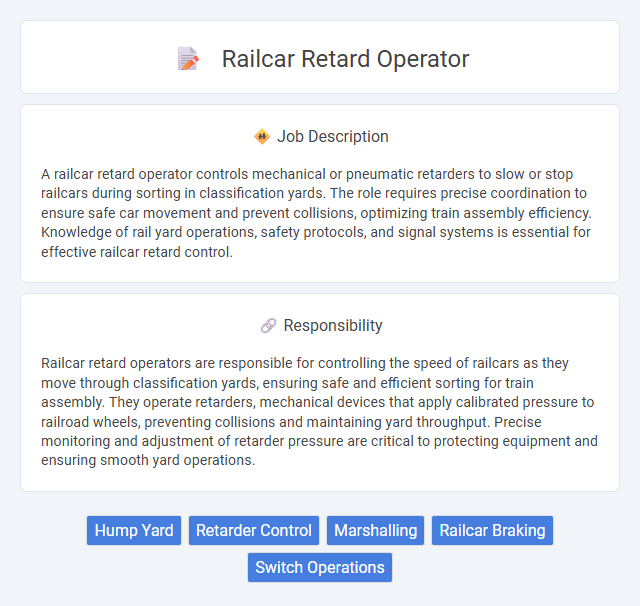
A railcar retard operator controls mechanical or pneumatic retarders to slow or stop railcars during sorting in classification yards. The role requires precise coordination to ensure safe car movement and prevent collisions, optimizing train assembly efficiency. Knowledge of rail yard operations, safety protocols, and signal systems is essential for effective railcar retard control.
Railcar retard operator roles may likely be best suited for individuals with strong spatial awareness and the ability to remain calm under pressure due to the fast-paced and safety-critical nature of the work. Candidates with good physical stamina and attention to detail might have a higher probability of performing well in this role, given the need for precise control of railcar speeds. Those prone to anxiety or difficulty with quick decision-making could potentially find the demands of this position challenging.
Qualification
A Railcar Retard Operator must possess a strong understanding of railcar handling procedures, safety regulations, and mechanical operation of retarders used to control railcar speed during sorting. Candidates typically require prior experience in railroad yard operations, teamwork skills, and the physical ability to manage demanding work environments. Certifications related to railroad safety, such as FRA compliance training and hazardous materials awareness, are highly beneficial for successful job performance.
Responsibility
Railcar retard operators are responsible for controlling the speed of railcars as they move through classification yards, ensuring safe and efficient sorting for train assembly. They operate retarders, mechanical devices that apply calibrated pressure to railroad wheels, preventing collisions and maintaining yard throughput. Precise monitoring and adjustment of retarder pressure are critical to protecting equipment and ensuring smooth yard operations.
Benefit
Railcar retard operator positions likely offer competitive wages and opportunities for overtime, contributing to steady income growth. Benefits may include health insurance, retirement plans, and paid time off, enhancing overall job security and work-life balance. Probable access to training programs could support skill development and career advancement within the rail industry.
Challenge
Railcar retard operator roles likely involve managing the speed of railcars to ensure safe and efficient train assembly, presenting constant challenges in maintaining precise control under varying conditions. The job probably demands quick decision-making and keen attention to detail to prevent accidents and ensure smooth operations. Facing unpredictable factors like weather or equipment malfunctions may further complicate the task, requiring adaptability and problem-solving skills.
Career Advancement
Railcar retard operators play a crucial role in controlling the speed of railcars to ensure safe and efficient yard operations, serving as a foundational position within the rail industry. Mastery in this role can lead to career advancement opportunities such as yardmaster, locomotive engineer, or safety supervisor, offering increased responsibility and higher earning potential. Continuous training in railcar handling techniques, safety protocols, and operational technology further enhances promotion prospects and long-term career growth in railroad operations.
Key Terms
Hump Yard
Railcar retard operators in Hump Yards control the speed of railcars as they roll down the hump, ensuring safe and efficient classification of railcars into designated tracks. They utilize retarders--mechanical braking devices--to prevent collisions and maintain precise spacing between railcars during sorting operations. Expertise in monitoring yard control systems and adhering to safety protocols is essential for minimizing derailments and optimizing rail yard throughput.
Retarder Control
Railcar retard operators specialize in controlling retarder systems to safely regulate the speed of railcars during switching and classification in rail yards. Precision in retarder control ensures smooth deceleration and prevents collisions, optimizing yard efficiency and enhancing operational safety. Expertise in monitoring mechanical retarder performance and adjusting pressure is essential for maintaining consistent braking force on moving railcars.
Marshalling
Railcar retard operators specialize in controlling the speed of railcars during the marshalling process within railway yards to ensure safe and efficient coupling. They utilize retarders--mechanical devices installed on tracks--to slow down or hold railcars, preventing collisions and optimizing train assembly. Expert knowledge of marshalling yard layout and railcar handling is crucial for maintaining operational flow and minimizing delays.
Railcar Braking
Railcar retard operators control the braking systems on railcars to regulate speed and ensure safe coupling during switching and classification yard operations. Mastery of pneumatic and dynamic braking mechanisms is essential to prevent collisions and maintain efficient rail yard flow. Expertise in monitoring brake pressure and adjusting retarders is critical for minimizing damage and improving operational safety.
Switch Operations
Railcar retard operators specialize in controlling railcar movements through precise switch operations to safely manage train assembly and disassembly processes. Their expertise in operating retarders and switches ensures smooth railcar speed regulation, minimizing collisions and equipment damage. Accurate switch alignment and timely communication with yard personnel optimize rail yard efficiency and bolster overall transportation safety.
 kuljobs.com
kuljobs.com